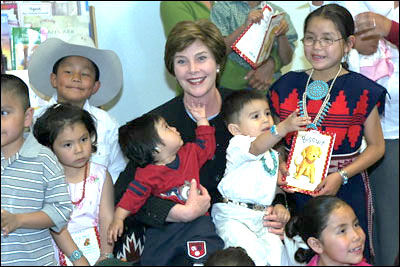|
Home >
Mrs. Bush
|


Children at the Kayenta Indian Health Service Clinic on the Navajo Nation gather around Mrs. Bush after reading with her May 8 , 2003. White House photo by Susan Sterner.
Ready to Read, Ready to LearnAs a child, I loved listening to my mother read to me. Little did I know that she was doing much more than providing comfort and entertainment; she was paving the way for my learning and success in school. Research tells us that the early language experiences and education we provide our children shape the way they think and learn. The quality of these experiences affects a child's enthusiasm for learning, ability to interact with others and success in school. Though many children grow up hearing a broad vocabulary and being read to from infancy, others enter school without knowing the names of letters or how to count. For these children, reading and learning can be a struggle. If they are unable to overcome this obstacle, their loss affects all of society. Our challenge is to reach all children early so that every child starts school with the skills needed to learn. Once they are in the classroom, our children deserve excellent teachers and a high-quality education. As a mother and former public school teacher and librarian, I believe we all have a duty to help our children achieve success. And I am proud to join President Bush in his goal to make America's schools the best they can be. Ready to Read, Ready to Learn Summary Laura Bush understands the responsibility that parents and other adults have to help children develop strong cognitive skills in the early years so that they are prepared for school. As a former public school teacher, Mrs. Bush also knows that the quality of a child's education hinges on the quality of that child's teachers. With this in mind, Mrs. Bush launched her Ready to Read, Ready to Learn initiative with two major goals:
The Ready to Read, Ready to Learn initiative works to achieve these goals by:
Teaching reading is one of America's top domestic priorities. The Bush Administration wants parents - children's first and most important teachers - caregivers and teachers to have the most effective tools and information for teaching reading, after all, reading is the skill upon which all other learning skills are based. Research shows that reading to children early and often is the best way to ensure success in school and in life. Children need basic skills to prepare them for learning to read. Because these skills are not developed automatically, children need help and practice through language play, sound games, reading aloud together, and talking about book characters and content. Many children have difficulties learning to read because they did not develop the basic building blocks of language during their early years. Vocabulary knowledge, letter recognition, and phonemic awareness are significant predictors of a child's ability to do well in school. Laura Bush believes that everyone in America should know how important basic language and reading skills are for young children. Moms, dads, grandparents and all those who care for children at some point during the day need to know about specific age-appropriate, fun activities that prepare children for learning in school. Just as children should be ready to learn to read when they start school, teachers should be able to teach reading when they enter the classroom. Research shows which teaching methods are most effective. Teachers should learn effective teaching methods. Teachers need training and the resources to succeed, including:
The The No Child Left Behind Act is the greatest federal investment ever $4 billion to recruit, prepare and train teachers. The Act, passed overwhelmingly by Congress, gives schools much more flexibility to use federal funds where the local need is greatest. President Bush has charged the U.S. Department of Education with developing a database of the most recent and reliable information on what works in teaching reading. Teachers and schools will have the best information available to them at the click of a mouse. These reforms and resources are key to improving America's schools. Mrs. Bush's Ready to Read, Ready to Learn initiative is an integral part of the President's education reforms. The initiative is designed to:
|
|


